America's Fight for Democracy Has Always Been a Farce
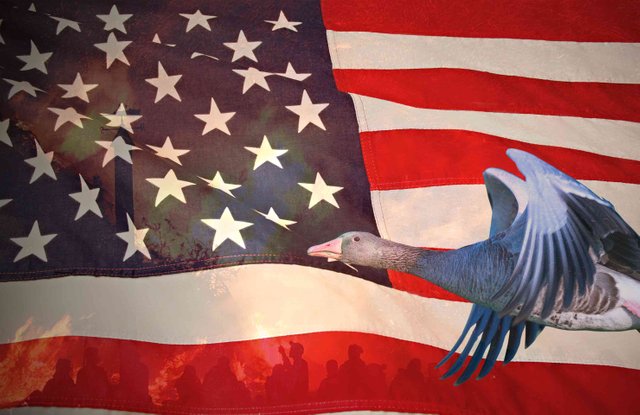
The idea that America is the land of the free and the home of the brave proposes the idea that it is a democratic republic by the people for the people. That idea is incredibly wrong.
Champions of Democracy
We live in a world of various ideologies which creates a distinct split amongst not only government institutions, but also the citizens of these nations. Democracy as a force of good is put on a pedestal and pressed into the minds people through educational systems and propagandic media.
Every democratic nation has a proud story about how it reached that ultimate goal of democracy. The United Kingdom talks of the Magna Carta and the one-thousand years of suffrage that followed. Equally, the US speaks of the Boston Tea Party, the noble George Washington, and the heroic Paul Revere.
Seen even by other democratic nations as overly propagandistic, the Pledge of Allegiance has shamed children into following a predetermined propaganda model.
Whenever the US invades or intervenes in another country, its citizens believe this is in the name of freedom. Sometimes even sarcastically joking that US bombs are the delivery mechanism for this freedom.
The narrative that the West or the United States is a champion of democracy around the world is a myth. It is incredulous with so many truths revealed about actions performed by the US government that any would continue believing the government cares about democracy at all.
Supporting Democracy Only When Convenient
The Arab Spring of 2011 inspired an uprising in Egypt resulting in the Egyptian revolution of 2011. As protests and violence continued, then US Deputy Secretary of State William Burns visited Egypt following the ousting of president Mohamed Morsi.
On Egypt, Burns said, "Only Egyptians can determine their future. I did not come with American solutions, nor did I come to lecture anyone. We know that Egyptians must forge their own path to democracy. We know that this will not mirror our own and we will not try to impose our model on Egypt."
This sentiment was echoed by other politicians at the time, including but not limited to President Barack Obama, Republican Senator John McCain, and Secretary of State John Kerry.
Did the US Government actually care about democracy in Egypt?
As a result of the Arab Spring in 2011, the sitting government of Egypt was overthrown resulting in democratic elections that were won by Morsi. However, when Morsi was removed in another coup, the US refused to officially acknowledge a coup had taken place. Acknowledging a coup occurred would mean mean that by law, the US government would be required to cut off military and economic aid to Egypt.
By continuing to provide aid in the form of US$1.3 billion in military aid and US$250 million in economic aid, the US was choosing to continue fueling a regime that had overthrown a democratically elected president. This is not the first or last time the US government has supported regime change in a democratic nation for geopolitical reasons.
A History of Undermining Democracy Abroad
When choosing whether or not the US Government is applauding democracy ultimately depends on whether or not that government aligns itself to the US. It has been proven multiple times throughout history that the US chooses its allies not because of freedom or democracy. Contrary to what William Burns said in regards to accepting democracy in Egypt even if did not resemble US democracy, the US has very much undermined democracies around the world that do not align with US interests.
Korea (1945)
Upon the surrender of the Empire of Japan in August 1945, an interim government was created under the leadership of centrist-left Lyuh Woon-Hyung. Lyuh was a member of the Koryo Communist Party as well as Sun Yat-Sen's Chinese Nationalist Party, highlighting his centrist position in a world of extremes.
The interim government was named the People's Republic of Korea (PRK) and looked to establish an independent and unified Korea. Upon the landing of US forces in September 1945 the US immediately established the United States Army Military Government in Korea (USAMGK) and outlawed the PRK. Instead of working towards allowing the newly freed Koreans to choose their own government, the US staffed the administration with Japanese officials and Korean collaborators during the war.
USAMGK military units carried out several mass atrocities against Koreans who sought independence, such as at the Jeju Massacre. The first president of Korea, Syngman Rhee, was a puppet chosen strictly for his alignment to US ideologies. He was flown aboard US military aircraft back to Korea illegally through the actions of OSS agent Preston Goodfellow.
Syria (1949, 1956, 1957)
In March 1949, the president of Syria, Shukri al-Quwatli, was ousted in a coup led by a military junta. The book America's Great Game by Hugh Wilford, Wilford speaks of the involvement of the US government and the Central Intelligence Agency's (CIA) assistance in overthrowing the democratically elected government in Syria.
Although the involvement of the US government and CIA is controversial, the Trans-Arabian Pipeline shows us motive. Construction of the pipeline began in 1947 and was managed by an American company, Bechtel. Opposition from the Syrian government had held up the project.
In the book Lords of the Desert: Britain's Struggle with America to Dominate the Middle East by Simon & Schuster it is highlighted that the head of the CIA's Damascus station, Mike Copeland, manufactured the coup in order for a regime change to a government which would approve pipeline the project.
The CIA continued attempts at regime change in Syria as the government failed to align to US ideologies. 1956 was the year of Operation Straggle and 1957 included Operation Wappen as well as an assassination plot.
Iran (1953)
Operation Boot (UK) and Operation Ajax (US) were covert actions in Iran in order to overthrow the democratic government of Prime Minister Mohammad Mosaddegh. The motivations for this coup were the Iranian government's decision to nationalise their oil industry and expel foreign representatives. Favoring the monarchist government of Mohammad Reza Pahlavi, the democratic government was ousted with the assistance of the US and UK.
Guatemala (1954)
Operation PBSUCCESS was carried out by the CIA so as to overthrow the democratic government of President Jacobo Arbenz. Besides communism, one of the main motivators of this regime change was the United Fruit Company. Due to Arbenz' ending of exploitative labor practices, the United Fruit Company had seen a drop in its profits.
Vietnam (1954-1963)
Vietnam's independence from French control was marked by the surrender of the French garrison at Dien Bien Phu on May 7th, 1954. Upon this surrender, Vietnam was temporarily separated at the 17th parallel after the 1954 Geneva peace conference. Elections were scheduled to occur in 1956 where the country would vote on a unified government.
As then US President Dwight D. Eisenhower wrote in 1954:
I have never talked or corresponded with a person knowledgeable in Indochinese affairs who did not agree that had elections been held as of the time of the fighting, possibly eighty percent of the population would have voted for the Communist Ho Chi Minh as their leader rather than Chief of State Bao Dai. Indeed, the lack of leadership and drive on the part of Bao Dai was a factor in the feeling prevalent among Vietnamese that they had nothing to fight for.
Ngo Din Diem was appointed as the Prime Minister of South Vietnam by Bao Dai in early 1954. Contrary to advice from his CIA advisors to make the vote rigging less obvious, Diem became the president of South Vietnam with official results showing a 98.2% vote in favor of Diem.
Besides supporting and advising on these rigged elections, the US perpetuated an unnecessary war in the name of democracy while not allowing democratic elections to be held.
Indonesia (1957-1959)
CIA aerial bombardment purposely targeted civilian and commercial ships so as to create fear in Indonesian waters. This was done to deter foreign trade and destabilize the democratically elected government in Indonesia. The coup attempt ultimately failed.
Brazil (1961-1964)
Operation Brother Sam aimed to destabilize the Brazilian government of Joao Belchior Marques Goulart, the vice president who legally succeeded to the position of president. This was accomplished by cutting off aid to the legitimate government and instead providing aid to those who opposed the legal president. In the April 1964 coup, the military regime of General Humberto de Alencar Castelo Branco was established and immediately arrested 50,000 political opponents at the approval of the US government.
These destabilisation methods are a common tool in the US arsenal.
Nicaragua (1960-1984)
Although judged to be free and fair, the Nicaraguan general elections of 1984 were criticized by the Reagan administration for being a "sham". The US insinuated that because one of the nominated candidates, Arturo Cruz, did not participate in the elections, the elections were not legitimate. However internal arguments show that the US government was actually happy Cruz did not participate, as this would further legitimize the elections and give less reason for American aid to the contra rebels.
Democracy as an Afterthought
If the US was a true champion of democracy, it would also not support authoritarian governments. In the mid-1960s, the US was aware of mass killings of communists by conservative generals Indonesia. Not only were US officials overjoyed by these revelations, they also encouraged these killings in favor of their own geopolitical interests.
Something more modern and current would be the US ties to Saudi Arabia. Many lament the fact that it is a well-known the September 11 attacks on the US were orchestrated by Saudi nationals. The US however, continues to provide aid to the Saudi Government. In the recent killing of journalist Jamal Khashoggi in the Saudi Arabian consulate in Istanbul, the US has shown again that its geopolitical interests trump any sort of idea of justice or freedom.
Your Apathy in US Democracy is Manufactured
Americans are told from the beginning of their lives that their vote matters. It is driven into you why democracy is the best possible form of government, regardless of its flaws. Even as US democracy collapses around itself, these ideas are parroted.
Indeed it has been said that democracy is the worst form of Government except for all those other forms that have been tried from time to time. - Winston Churchill
Truth is the US is an incredibly poor example of a government for the people by the people. We do not need to look very far back when society in the US was for all intents and purposes an apartheid state. There are people alive right now in the US when this was still true. To these peoples, this is not the distant memory it is taught to be, it is a childhood memory. Through the eyes of nostalgia, these were the good ol' days.
It is also incredibly dishonest how little legitimate criticism of US democratic policies occur in the media. Media organizations focus on the most prominent and attention grabbing outrage whilst largely ignoring the bigger issues that have always been present.
Democratic National Committee Slaps you in the Face
In the Democratic National Committee's (DNC) own charter, Section 4 states:
In the conduct and management of the affairs and procedures of the Democratic National Committee, particularly as they apply to the preparation and conduct of the Presidential nomination process, the Chairperson shall exercise impartiality and evenhandedness as between the Presidential candidates and campaigns. The Chairperson shall be responsible for ensuring that the national officers and staff of the Democratic National Committee maintain impartiality and evenhandedness during the Democratic Party Presidential nominating process.
Regardless of the source of the 2016 DNC email leaks, it revealed a damaging fact. Besides deriding its own donors, the DNC was not following anything remotely close to impartiality between the nominees.
Emails showed clear collaboration between the Clinton campaign and the DNC as well as the disdain amongst its staff of Sanders. As chairperson of the DNC, it was Debbie Wasserman Schultz's responsibility to ensure impartiality per the DNC's own charter.
After the elections, a lawsuit was filed against the DNC by Sanders supporters. The DNC's argument was a slap to the face of the entire Democratic Party and all its members.
Bruce Spiva, the lawyer defending the DNC in court, made these arguments:
And the Court would have to basically tell the party that it couldn't change that rule, even though it's a discretionary rule that it didn't need to adopt to begin with.
The Court would have to find that these individuals were induced to give money to Representative Sanders -- sorry -- Senator Sanders on the basis that there would be this neutrality that there purportedly was not, and that they wouldn't have -- they relied on that, and that they wouldn't have given that money otherwise.
Long story short, the DNC does not actually have to follow its own rules because they are discretionary. What members of the Democratic Party expected of their donations did not matter.
First-Past-the-Post Voting
First-past-the-post (FPTP) voting is the idea of a direct winner takes all or a majority wins voting system. Although this sounds fair at a glance, it is actually chock-full of problems. Solutions to these problems exist, but the reason you have never heard of these solutions is because politicians prefer the status quo that keeps them in power.
Tactical Voting
It happens every election and is the main purpose behind the preliminaries. Your choices have to be reduced because more candidates actually create a possibility of the overall minority winning the election.
In the hypothetical vote above, Trump is the victor in a FPTP system since he has the largest amount of votes with 35%. However, if you add up the percentages of all other candidates, that equates to 65% of the vote. This means the majority of voters are unhappy with the winner. This forces not only the consolidation of candidates, but also forces voters to tactically choose the "lesser of evils" when making votes.
Effect on Political Parties
Per the example pie chart tactical voting reduces the number of politcal parties. Those who know Sanders is losing to Clinton would shift their votes to Hillary, the lesser of two evils for them. Similarly the Kasich votes would shift votes to Trump. In this hypothetical scenario, this would make Clinton the winner with 51% vs 49%. Duverger's Law states that an inevitability of a FPTP system is that the system will be reduced to a two-party system.
Instead of being able to choose the candidate that most suits the voter, votes are given to the candidate most able to win. The voters who chose Kasich or Sanders in the example compose 35% of the voters and it is these people who become apathetic to the election process.
Wasted Votes
If voters choose to continue voting for Kasich or Sanders in the example election, these would be considered wasted votes. If more voters cast their votes for Trump, then this would also be considered a wasted vote as Trump is already winning when the votes are split 4-ways.
Gerrymandering
Gerrymandering is one of the more often discussed aspects of US politics. Ignored is the fact that gerrymandering is more prevalent in FPTP election systems due to wasted votes. Since votes can be wasted in a FPTP system, electoral districts are designed to ensure a few safe enclaves where a political party has a majority vote. They then throw away the wasted votes in numerous smaller districts.
Gaming the system in this way ensures a minimum number of easy victories for a specific party in selected districts. Even when these district lines are drawn by bipartisan parties, this manipulation of the system is inevitable as both parties benefit from guaranteed wins.
Solutions to FPTP
Plenty of solutions exist to not only reduce the negative effects of FPTP voting, but also to engage voters in a way that they do not become apathetic towards the voting system.
Alternative Vote (Instant Runoff)
Alternative votes allow for a voter to choose multiple candidates. Instead of only being able to cast a single vote for a single candidate, a voter is able to rank their votes for multiple candidates. Sanders voters can vote for Sanders and put their lesser of two evils, Clinton, as their secondary vote. If Sanders does not have the majority as he does not in the hypothetical vote, then the vote is shifted to Clinton.
An ability to vote for your preferred candidate regardless of his winning potential promotes healthy political diversity. This allows for more political parties with a more diverse set of ideologies. Voters are more engaged to vote for the political candidate they support on the chance their candidate can win. The candidates and their political parties can also see how many people support them, driving interest in future campaigns.
Mixed-Member Proportional Representation
Another tool to ensure proportional representation is mixed-member proportional representation (MMP). In an MMP system, voters get two separate votes, one for their preferred candidate and also one for their preferred political party.
Imagine there are five districts voting for a representative.
If using FPTP voting in the above example, all five representative seats would be for Trump's political party. Trumpists would have 100% representation whereas the remaining 50.2% of voters have zero representation.
MMP resolves this problem by adding additional seats and a secondary appointing system. If there are five districts, then imagine if there were ten seats. Trumpists would still win five of those ten seats in the initial pass. However, since voters also vote for their political party in an MMP voting system, the remaining seats are appointed depending on the percentage of votes and existing representation.
The remaining seats are appointed until the party's representation is over-represented in comparison to the percentage of votes they received. If four of the remaining seats are given to the Clinton party, this means of the nine appointed seats, 44% belong to Clinton and 56% belong to Trump, resulting in both parties being over-represented when comparing to the percentage of votes for each party. The remaining seat is thus given to the Sanders party.
Instead of the previous results, where Trump's party received 100% representation, the delegation of the remaining seats in the MMP system creates a much more proportionate representation of all voters. Proportionate representation engages voters to vote because they feel not only that their vote matters, but that the person representing them closely aligns with their own views.
Current State of US Politics - Lost Cause?
The current political atmosphere in the US is a direct result of FPTP voting. Although some states and organizations utilize solutions such as instant-runoff voting by allowing an alternative vote, it is an issue that needs to be addressed on a much larger scale.
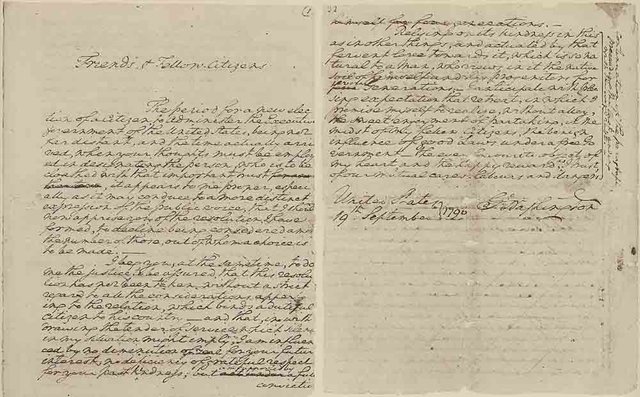
Excerpt of George Washington's handwritten farewell address
President George Washington after deciding not to seek reelection for a third term in 1796, began drafting a farewell address to the American people. In this 32-page handwritten address, Washington warned against steadfast loyalty to political parties. This has been largely ignored as toeing party lines is what has put the US in its current state of political turmoil.
Until you hear of politicians looking for true election reforms that address the issues of FPTP know that none of them truly care whether or not you are represented.
Your Apathy Makes it all Possible
You would think that for a country that has put democracy on a pedestal for a few centuries would have resolved the issues of voter or election fraud. Yet these issues rise to the front every election cycle and every year Americans shrug their shoulders and move on.
The US Government is not naive to the fact that there are problems with the system or even with its position in the world. Any idea of the US Government as a champion of freedom and democracy is only possible because of your apathy, blindness to the truth, and undeserved love of country. Ideas of life, liberty, and justice, never actually belonged to all Americans because the system has always been built in a way to disenfranchise minority ideologies.
Until American voters rise up and truly seek change, American Democracy is doomed to stagnation and possibly death.
Posted from my blog with SteemPress : https://leonox.me/2018-12-14/posts/americas-fight-for-democracy-has-always-been-a-farce/
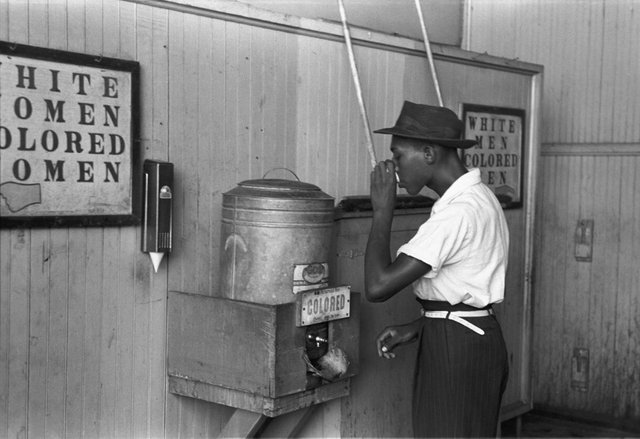
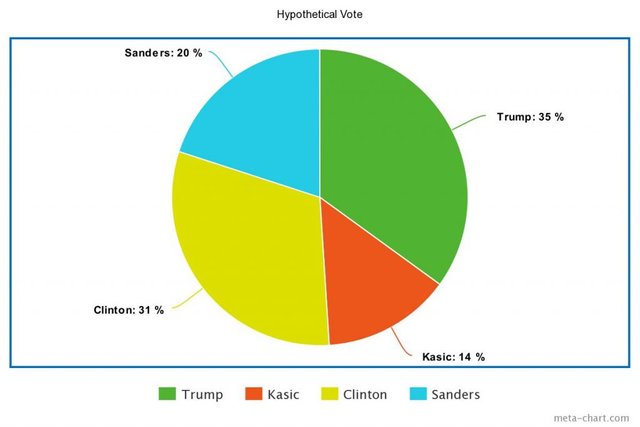
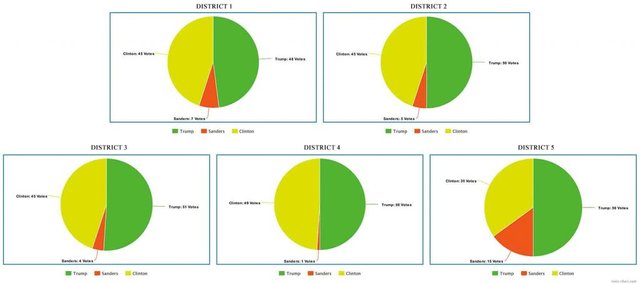
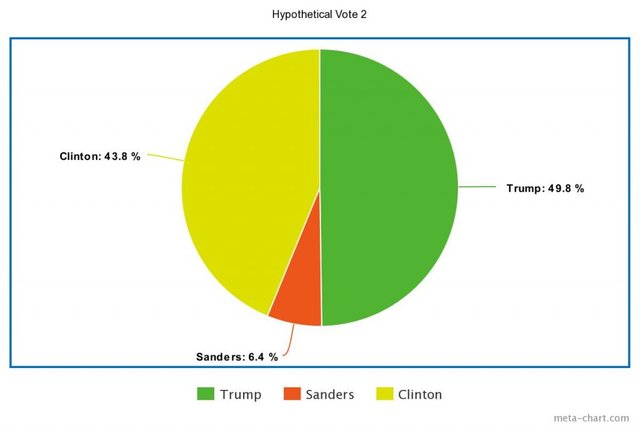
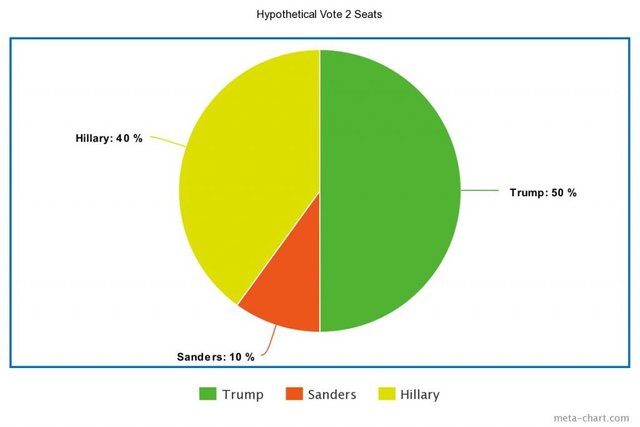
Congratulations @leonoxme! You have completed the following achievement on the Steem blockchain and have been rewarded with new badge(s) :
Click here to view your Board of Honor
If you no longer want to receive notifications, reply to this comment with the word
STOP